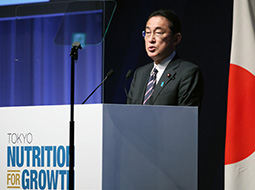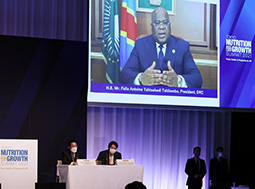
Prime Minister Kishida delivering an opening speech at the Tokyo Nutrition for Growth (N4G) Summit 2021 
Prime Minister Kishida (left) and Foreign Minister Hayashi (right) listen to the speech by H.E. Mr. Félix Antoine Tshisekedi Tshilombo, President of the Democratic Republic of the Congo
- PREVIOUS
- NEXT
December 2021
The Tokyo Nutrition for Growth (N4G) Summit 2021 (High Level Sessions)


On December 7, 2021, the High Level Sessions of the Tokyo Nutrition for Growth (N4G) Summit 2021 was held. This Summit was hosted by the Government of Japan and held in a hybrid format that combines on-site participation of domestic participants and on-line participants from overseas. At the Opening Session, Mr. Kishida Fumio, Prime Minister of Japan, delivered an opening speech and Mr. Hayashi Yoshimasa, Minister for Foreign Affairs, made a welcome speech.
The overviews of the sessions are as follows.
The Tokyo N4G Summit 2021 was organized to direct ways for the international community to improve nutrition as well as to encourage a wide range of stakeholders to take concrete actions through their announcements of policy and financial commitments, and to lead global measures for nutritional improvement. More than 50 participants in total attended the High Level Sessions on the first day of the Summit, which included leaders and ministerial levels from about 30 countries, such as President of the Democratic Republic of the Congo, H.E. Mr. Félix Antoine Tshisekedi Tshilombo; Prime Minister of the People’s Republic of Bangladesh, H.E. Sheikh Hasina; Prime Minister of the Democratic Republic of Timor-Leste, H.E. Mr. Taur Matan Ruak, heads of international organizations such as Secretary-General of the United Nations, Mr. António Guterres; President of the World Bank Group, Mr. David R. Malpass; Director-General of the World Health Organization, Dr. Tedros Adhanom Ghebreyesus; representatives from civil society organizations, the private sectors and academia including the Bill & Melinda Gates Foundation. Many participants pointed out that “it is the critical time for the world to tackle nutritional problems that have been worsened by the COVID-19 pandemic,” and expressed appreciation by stating “it was timely that the Government of Japan hosted the Tokyo Nutrition for Growth Summit.”
Prime Minister Kishida stated that the “double burden of malnutrition,” where we see the co-existence of undernutrition that hinders growth, and overnutrition that causes lifestyle related diseases, has become a common global challenge. Furthermore, Prime Minister Kishida stated that the COVID-19 pandemic has worsened especially nutritional status of children, and he announced that Japan will provide nutrition-related assistance to the world, which will amount to over 300 billion Japanese yen, equivalent to more than around 2.8 billion U.S. dollars, for the next three years. Prime Minister Kishida also stated that, in the fight against COVID-19, Japan will donate approximately 10 million doses of vaccines to Africa given its urgent need, upon coordination with international organizations and relevant partners.
Minister Hayashi explained that this Tokyo Nutrition for Growth Summit focuses on five priority areas: (1) nutrition and Universal Health Coverage, (2) safe, sustainable, and healthy food systems, (3) measures against malnutrition in vulnerable situations, (4) data-driven accountability, and (5) financing for nutrition. In addition, he pointed out the necessity for governments, regardless of income level, private sectors, civil society organizations, and academia to unite to tackle this important issue. At the Closing Session, Minister Hayashi expressed gratitude for commitments from participants and said that each and all need to steadily fulfill its commitments in order to improve malnutrition and to solve the problems that the world is facing.
At the Summit, a wide variety of stakeholders, such as governments, international organizations, private sectors, civil society organizations, and academia, announced their policy and financial commitments. Over 390 commitments from approximately 180 stakeholders including 66 countries and 26 private sectors have been submitted and the financial contribution of over 27 billion U.S. dollars has been announced. In addition, the Tokyo Compact on Global Nutrition for Growth was issued as an outcome which indicates a direction for the international society to improve nutrition. The Tokyo Compact was endorsed by 214 stakeholders including 64 governments, 11 international organizations, 60 private sectors, and 58 civil societies.
Note: This article has been created with the consent of the Ministry of Foreign Affairs of Japan and on the basis of materials published by the Ministry
- PREVIOUS
- NEXT


